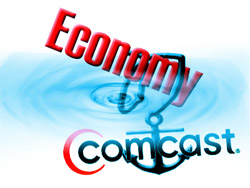Cable Company Ripping Off Houston
Amy Davis, Investigative Reporter for Click2 Houston.com and local channel 2, reports that Wave Vision, a Houston cable company, is not up to the task in the Lone Star State. According to Davis, the cable company may soon lose its license in Houston.
But the story won't end there because the state of Texas has preempted most local authority to protect consumers and the City's interests. Franchises like this one were grandfathered in when AT&T pushed its statewide franchising legislation that made the state responsible for enacting the franchises that allow video providers to put their cables in the rights-of-way and offer services to residents. And that law does not allow the state to refuse franchises to deadbeat corporations.
As long as a company fills out the form, the state must grant a franchise and the City has to abide by it. This leaves the City with only one option - taking the company to court. And that means more legal expenses. But when Houston wins the case, and it almost certainly will, it is not clear that they will be able to collect because the company will likely declare bankruptcy and the City will be just one of several with unpaid debts.
This is what happens when AT&T writes the legislation that takes power away from communities and puts it in the state or federal levels. State and federal government is not as responsive to citizens as local and is not equipped (nor authorized in many circumstances) to protect the public interest.
Now for the background on just how bad company is, another reminder of why communities must have the authority to build their own networks rather than being stuck with companies like this.
Customers have complained to the local Better Business Bureau 90 times and 61 of those complaints have gone unanswered, driving the BBB rating to an F for Wave Vision. (And those are just the complaints the BBB knows about!)




 The Customer Service Rep could not tell me the new account number. I asked if he could find it with several different pieces of unique information I did have and was told no. It was not possible.
Frustrated, I said, "screw it," and just plugged old Comcast modem into the network, wondering if it would magically work with the correct static IP. And Lo, we were back on the Internets.
The Customer Service Rep could not tell me the new account number. I asked if he could find it with several different pieces of unique information I did have and was told no. It was not possible.
Frustrated, I said, "screw it," and just plugged old Comcast modem into the network, wondering if it would magically work with the correct static IP. And Lo, we were back on the Internets.


